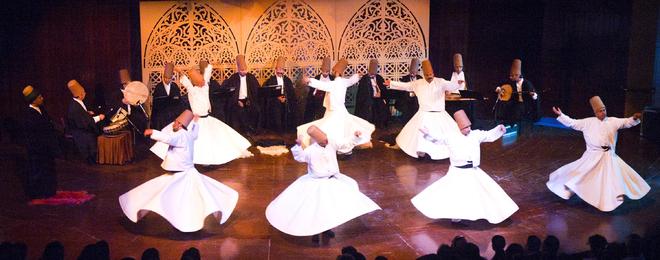Krishnaraj Iyengar
It is believed that true enlightenment comes when a seeker realises the core spiritual teachings of a faith and that love is central to them. Centuries ago in the Muslim world, there came a time when certain spiritually aware individuals sought inner, spiritual meaning of the teachings of the Koran. Love, they realised, was the essence of God and of faith and worship.
Thus emerged what was called Sufism (‘Tasawwuf’ in Arabic), or a universal, spiritual approach to faith where love was the focus of all existence. And like with the Bhakti saints of India, to express a deeper, loving connection with God, music acquired great importance in Sufi practice. In the 13th century Persia, there lived a Sufi master called Maulana Jalaludin ‘Rumi’, whose teachings of universal love are today revered the world over.
Serenading love
Rumi, known to the Turks as ‘Mevlana’, believed that God, the one, supreme reality was ‘Hazrat-e-Ishq’ or ‘The God of Unconditional Love’. Under this philosophy expressed through his sublime Persian poetry, his teachings united the whole of humanity irrespective of race, religion, colour or creed. Music through the ages has been called ‘Ghiza e Rooh’ or ‘food for the soul’ by the Sufi mystics. Pure, sacred music, they believed, aroused love and devotion in a seeker, bringing him closer to God.
The purpose of Sufi music is ‘Zikr’ or remembrance (of God). Although different forms of Sufi music exist in different parts of the world, including the Indian subcontinent, Rumi’s ‘Sema’ (‘listening’ in Arabic), a combination of dance and music is today, the most popular the world over. It is believed that Rumi, while in a marketplace, heard the rhythmic hammering of goldbeaters that happened to sound like ‘La ilaha illallah’ (There is no God, except God), Islam’s testimony of faith. This inspired him with the idea of Sema.
Otherwise known as the Whirling dervish ceremony, Sema is performed the world over, especially in Turkey and a few other parts of the Muslim world.
Defined by tradition
Sema has been practiced as an ancient tradition right from Rumi’s time by the ‘Mevlevi’ Sufi order he had founded. In Konya, a town in Turkey’s Anatolian region, where stands Rumi’s grand mausoleum, ‘Shab e Urus’ (‘wedding night’ in Persian) is celebrated each year during winter with Sema ceremonies which are also performed in other parts of Turkey and the world. It was the night when Rumi ‘united with his beloved (God) in sacred union’, hence the term ‘wedding night’.
Typically, an orchestra of traditional musicians accompanies a group of dervishes who perform ‘Raqs’ or the whirling dance. While instruments like the kudum drum, daf, ney flute, qanun (type of santoor), klassic kememche and tambur are played by the musicians, the orchestra also includes singers with soulful voices.
An intricate four-section style of classical Ottoman music called ‘Ayin’ forms the basis of Sema. The ceremony beings with ‘Naat e Sharif’ (songs in praise of Prophet Muhammad). This is followed by a gradual unfolding of the actual whirling, which leaves the audience tearful and spellbound.
It is after rigorous spiritual and musical training that the dervishes, led by a Sheikh (master), whirl anticlockwise continuously with total ease. They are usually draped in white gowns signifying the ego’s shroud, a tall camel hair cap called ‘Sikke’, the ego’s tombstone and a black coat (which they shed), signifying worldly trappings. The significance of whirling is pure, boundless ecstasy the soul experiences after shedding the ego and uniting with God.
Sufi India
India has had a long history of Sufism. The mausoleums (‘dargahs’) of venerated saints are still revered by Indians of all creeds. Emperor Akbar, it is believed, was highly pluralistic in his approach to faith. Along with scholars of various religious frequenting his court, Sufi masters like brothers Abul Fazal and Faizi also had a deep impact on his life.
A follower of the Chishtiya Tariqah, he is said to have travelled on foot to the tomb of Khwaja Moinuddin Chishti in Ajmer to pray for a son. He was strongly influenced by the Sufi principles of ‘Wahdat al Wujood’(unity of existence) and ‘Sulh-e-Kull’ (peace with all) through which he inculcated tolerance, pluralism and universal coexistence in his kingdom. His greatest torchbearer was his great grandson Dara Shikoh, a staunch follower of Sufism, who studied Sanskrit, translated Hindu scriptures into Persian and discovered a synthesis between Islam and Hinduism.
The legacy of towering Sufis like Baba Bulleh Shah and Sheikh Farid of Punjab, Nizamuddin Awliya, Amir Khusro, Abdul Latif Bhitai of Sindh have been sung in the form of Qawwalis, and even many popular film numbers.
Unlock Exclusive Insights with The Tribune Premium
Take your experience further with Premium access.
Thought-provoking Opinions, Expert Analysis, In-depth Insights and other Member Only Benefits
Already a Member? Sign In Now










